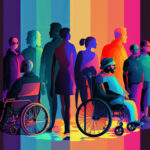One can’t miss the massive efforts underway at all levels of government to make healthcare more efficient, and more effective. Current buzzwords include “coordination”, “integration”, “innovation”, “navigation”. Billions of dollars are at work creating technological gadgets and devices that will produce reams of data, connecting patients and providers and providing instant analysis. Mobile apps will capture and track blood levels, oxygen levels, patterns of movement, sleep patterns, eye movements – if your body does it, it will be tracked.
There will no doubt be many meaningful systems changes. But my experience, based on daily visits with an aging family member, is that while these changes will be helpful, they will not address the pressing issue of social isolation. More seniors are living at home longer. Fewer seniors are living out their final years with family members. Whether they are living in their own homes or in congregate settings, every day I see seniors literally starved for meaningful human contact. A recent study by United Toronto & York Region (www.unitedwaytyr.com) does a great job of answering the question “Why Keeping Seniors Social Matters”. And it convincingly demonstrates the link between social involvement and good health.
The current focus on putting the patient and his/her needs at the centre of the care path is a good first step. I expect many senior patients would indicate that they would do better (stay at home longer, get more exercise, remember to take their medication) if they had human interaction to accompany the gadgets that will remind them. For planners and health agencies involved in system transformation non-traditional partnerships with community-based agencies may be an important strategy to achieving positive health outcomes.
All of our efforts to improve care, whether clinical interventions or systems level changes, need to have as a basic criterion the inclusion of some level of human interaction. Otherwise, we may be able to prolong life with a chronic disease, but we will die of loneliness instead.






